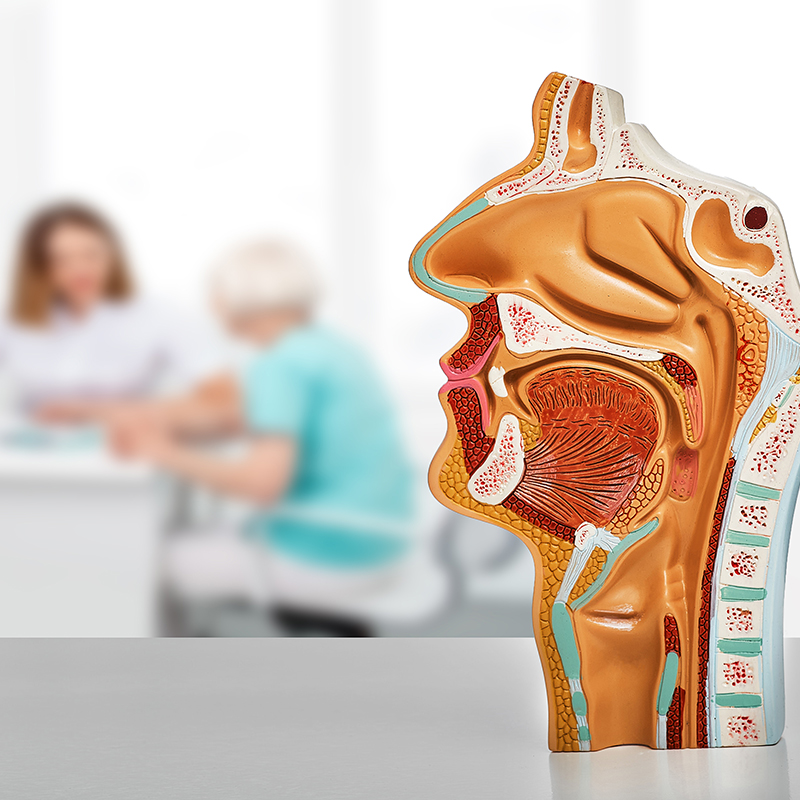
Turbinate Reduction
Expert Turbinate Reduction in Philadelphia, PA
At Becker ENT and Allergy, our team of experienced ENT specialists provides advanced treatments to improve nasal breathing and overall sinus health. One effective procedure for individuals struggling with chronic nasal congestion is turbinate reduction. This procedure can enhance airflow, reduce nasal obstruction, and improve overall quality of life. Our Philadelphia-based practice offers state-of-the-art care for patients suffering from turbinate hypertrophy and other nasal conditions.
Nasal turbinates are structures inside the nose that help filter, humidify, and direct airflow. When these turbinates become enlarged due to allergies or environmental factors, they can cause significant nasal obstruction. Turbinate reduction is a minimally invasive procedure designed to decrease the size of these turbinates while preserving their essential function. If you suffer from persistent nasal congestion, difficulty breathing through your nose, or snoring related to nasal blockage, turbinate reduction may be a beneficial solution for you.
What is Turbinate Reduction?
Turbinate reduction is a surgical procedure that reduces the size of the nasal turbinates to improve airflow through the nasal passages. The turbinates are small, bony structures covered by soft tissue that help humidify and filter the air we breathe. However, when they become enlarged due to inflammation, allergies, or chronic sinus issues, they can obstruct normal breathing and lead to discomfort.There are 3-4 turbinates on each side of the nasal cavity. Typically, turbinate reduction surgery refers to the inferior turbinates which run the entire length of the nasal cavity.
There are several methods used to perform turbinate reduction, including:
Radiofrequency ablation (RFA)
Uses heat energy to shrink the turbinates with minimal tissue damage.
Coblation
A gentle technique that reduces turbinate tissue while preserving normal function.
Submucosal resection
Involves removing excess tissue while keeping the outer mucosal lining intact.
Laser-assisted reduction
Uses laser energy to decrease turbinate size and improve airflow.
Each technique is selected based on the patient’s specific condition, ensuring optimal results with minimal discomfort.

What Does Turbinate Reduction Treat?
Turbinate reduction is primarily performed to address nasal obstruction and breathing difficulties caused by enlarged turbinates. Patients experiencing the following conditions may benefit from the procedure:
By addressing these issues, turbinate reduction can significantly improve breathing, sleep quality, and overall comfort.
Candidates for Turbinate Reduction

Patients who experience chronic nasal congestion that does not improve with medication may be candidates for turbinate reduction. Ideal candidates include:
- Individuals with persistent nasal blockage that affects daily activities.
- Those who suffer from chronic postnasal drip.
- Patients experiencing difficulty breathing through the nose, particularly at night.
- People who rely on oral breathing due to nasal obstruction.
- Those with allergies contributing to turbinate swelling.
- Individuals without significant improvement from nasal sprays, antihistamines, or decongestants.
A consultation with an ENT specialist can help determine whether turbinate reduction is the best treatment option for your specific needs.
Consultation for Turbinate Reduction
Before undergoing turbinate reduction, a comprehensive consultation with an ENT specialist at Becker ENT and Allergy is necessary. During this appointment, the doctor will:
- Review your medical history, including any allergies or chronic sinus issues.
- Perform a physical examination of your nasal passages.
- Use nasal endoscopy to assess the degree of turbinate enlargement.
- Discuss your symptoms and their impact on your daily life.
- Explore alternative treatments and ensure surgery is the best option.
Our team takes a personalized approach to care, ensuring that each patient receives the most appropriate treatment plan for their condition.

Preparing for Turbinate Reduction
Proper preparation helps ensure a smooth procedure and recovery. Turbinate reduction is often performed either in an Ambulatory Surgical Center or in the Office. Before surgery, patients should:
Avoid blood-thinning medications like aspirin or ibuprofen, as advised by the doctor.
Stop smoking, as it can hinder healing.
Arrange for transportation home after the procedure.
Follow specific pre-operative instructions given by the surgeon.
Your ENT specialist will provide detailed guidelines tailored to your needs.
How is Turbinate Reduction Performed?
Turbinate reduction is typically performed as an outpatient procedure under local or general anesthesia. The specific method used depends on the patient’s needs:
This technique uses heat energy to shrink the turbinates while minimizing tissue damage. It is a quick and minimally invasive procedure with a short recovery period.
Radiofrequency Ablation (RFA)
This method utilizes controlled plasma technology to gently reduce turbinate size while preserving normal nasal function. It is known for causing less tissue damage and promoting faster healing.
Coblation
A laser is used to shrink and reshape the turbinates, improving airflow while reducing nasal obstruction. This technique is precise and minimally invasive.
Laser-Assisted Reduction
This method involves removing excess turbinate tissue while preserving the mucosal lining to maintain nasal function.
Submucosal Resection
The procedure generally takes around 30 minutes, and patients can return home the same day.

Turbinate Reduction Recovery
Recovery from turbinate reduction is typically quick and involves minimal discomfort. Patients can expect:
Most patients experience noticeable improvements in nasal breathing within a few weeks.

Potential Risks of Turbinate Reduction
As with any surgical procedure, there are some risks involved, although complications are rare. Potential risks may include:
Temporary nasal dryness or crusting.
Mild bleeding in the first few days.
Infection, though uncommon with proper care.
Over-reduction, leading to Empty Nose Syndrome (rare).
By choosing an experienced ENT specialist, the likelihood of complications is significantly reduced.
Why Choose an ENT Specialist for Turbinate Reduction?
An ENT specialist has extensive training in nasal anatomy and sinus conditions, ensuring safe and effective treatment. At Becker ENT and Allergy, our team offers:
Philadelphia Locations and Contact Information
Becker ENT and Allergy has multiple locations across Philadelphia for convenient access to expert ENT care. To schedule a consultation, contact us today.
Walnut Street Office
1608 Walnut St Suite 902
Philadelphia, PA 19103
Phone: (215) 929-8301
South Street Office
1740 South St Suite 401
Philadelphia, PA 19146
Phone: (215) 671-6330
Frequently Asked Questions About Turbinate Reduction
For expert care in turbinate reduction, contact Becker ENT and Allergy today to schedule your consultation!


